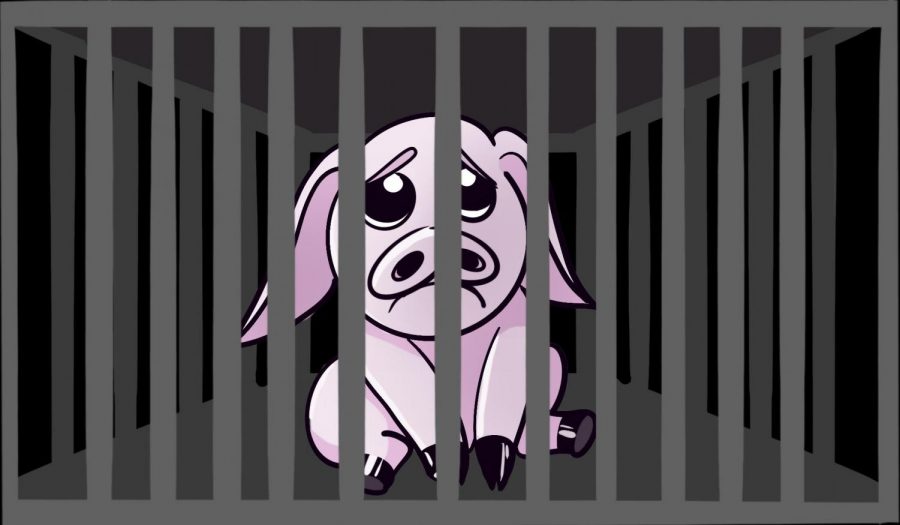Proposition 12, which seeks to modify existing regulations on farm animal compliance, is a political move San Diego State’s Vegan Club said they can get behind.
The proposition seeks to impose new regulations on the amount of cage space provided to egg-laying hens, breeding pigs and calves used for veal. Current regulations for farm animals are limited, requiring cages have just enough space for the creatures to turn around freely, lie down, stand up and fully extend their limbs. The proposed changes through Prop 12 would not take effect in until 2020.
Vegan Club President and Health Communication senior Steve Soto said Prop 12 would establish specific standards for the amount of cage space required for farm animals, a standard that had formerly been neglected by previous policies.
“It’s (currently) not really substantiated by any number,” Soto said. “However, (Prop 12) took that blind spot and tries to solve that.”
The Vegan club on campus, also known as the anti-animal cruelty club, encourages students to vote yes on Prop 12.
If Prop 12 passes, farm animal housing requirements would change to 1 sq. ft. of floor space for egg-laying hens and 43 sq. ft. of floor space for calves. By 2022, new regulations as part of the proposition would take place and require cage-free housing for egg-laying hens and a minimum of 24 sq. ft of floor space for breeding pigs.
The proposition would also make it illegal to sell products, such as eggs, uncooked pork or veal that was not raised in the proper housing requirements within the state of California or other states. Violators of the established housing regulations would be subject to a misdemeanor or a civil fine.
The ASPCA and Humane Societies of the United States are among many organizations who have asserted the confinement of animals is cruel and byproducts of tormented animals pose a threat of public health.
“Prohibiting the importation of animal products that were produced using these barbaric and unsafe methods protects farm animals as well as California consumers who don’t want to support such cruel practices,” the ASPCA said on its website.
While Prop 12 is similar to current Prop 2 laws, which were passed in 2008, Soto said the regulations put forward by Prop 2 were not put into effect until 2015.
“Prop 2 in 2008 was pretty much the equivalency of what this was, but this is more progressive,” said Soto. “So, in 2015 and kind of like this one, there’s progressive implementation to it to give people more time to adhere to the policies-farmers and what not.”
Opponents to the proposition say, once put into effect, Prop 12 could raise prices and lead to shortages for eggs, pork and veal due to farmers being required to create or rebuild new housing. The government could lose state revenue as a result of California farmers reducing or halting production due to rising costs.
One of the often opposing arguments to Prop 12 involves advocating for the abolition of animal abuse and exploitation in its entirety. Soto said, while this idea is good in theory, it is not realistic in terms of policy.
“If we can make every few years these incremental steps, then eventually we will reach that benchmark,” Soto said. “Even though it’s not about the abolition of (animal exploitation), it’s about policy that normalizes the value and the vote towards animal welfare and advocacy.”
Graphic design freshman Amy Bui said the proposal seems to have definite benefits for California’s agricultural sector.
“This proposal seems like it would have a positive effect on the farming and agriculture of California, even though I don’t advocate for any form of animal agriculture,” Bui said.
TFM freshman Julian Natividad said setting aside from economic considerations, people need to keep the best interest of the animals in mind.
“More space for animals mean healthier byproducts and happier animals,” Natividad said.









